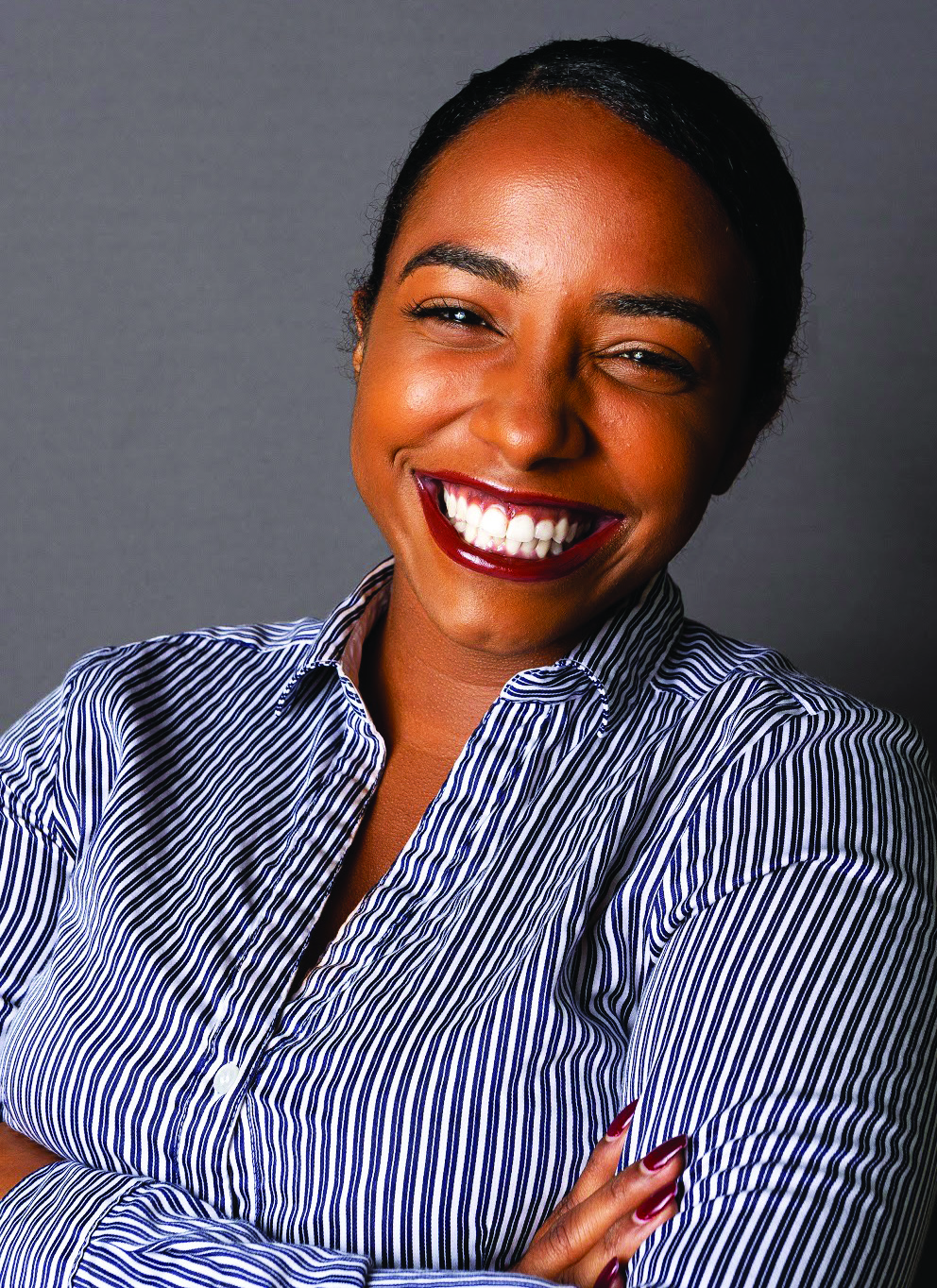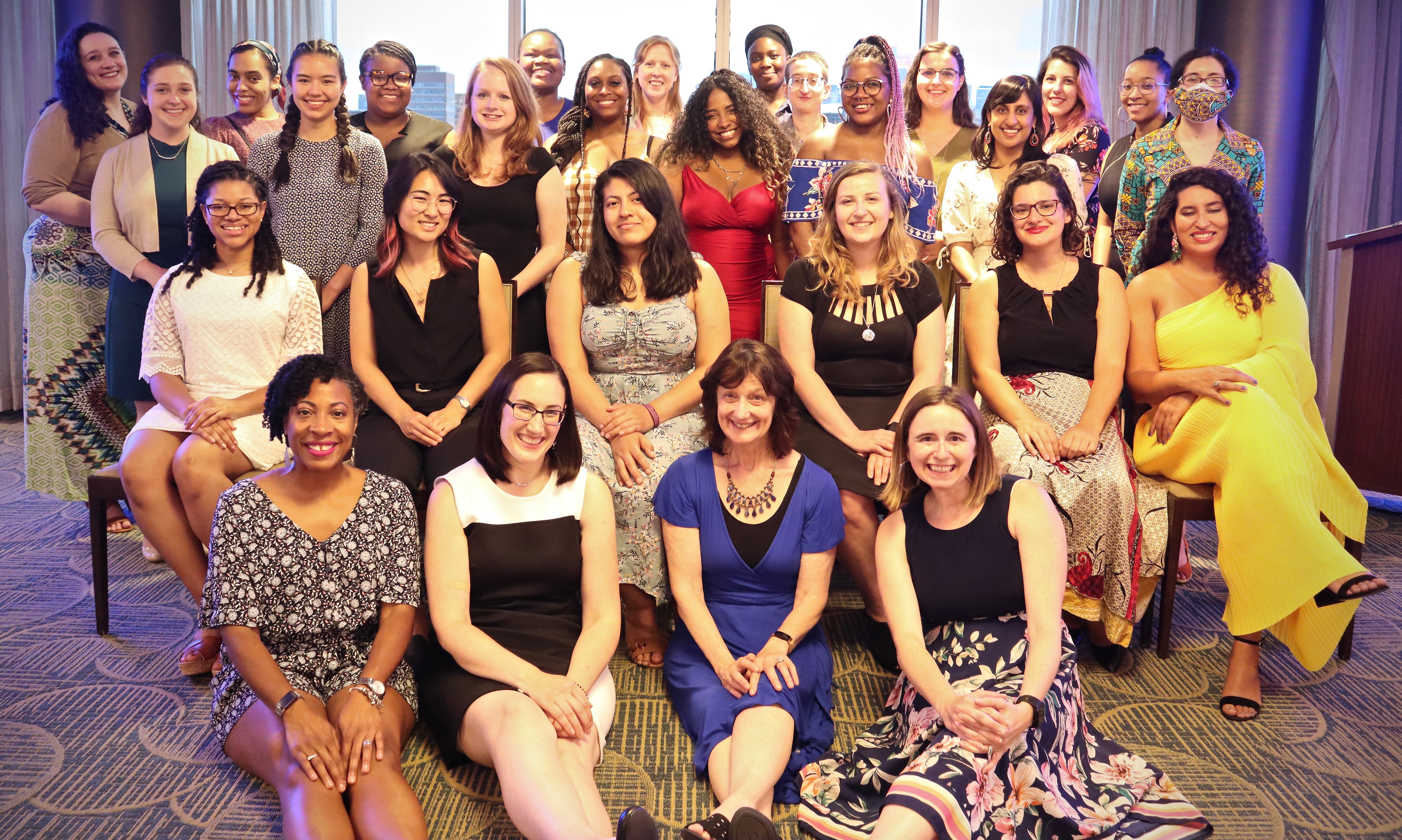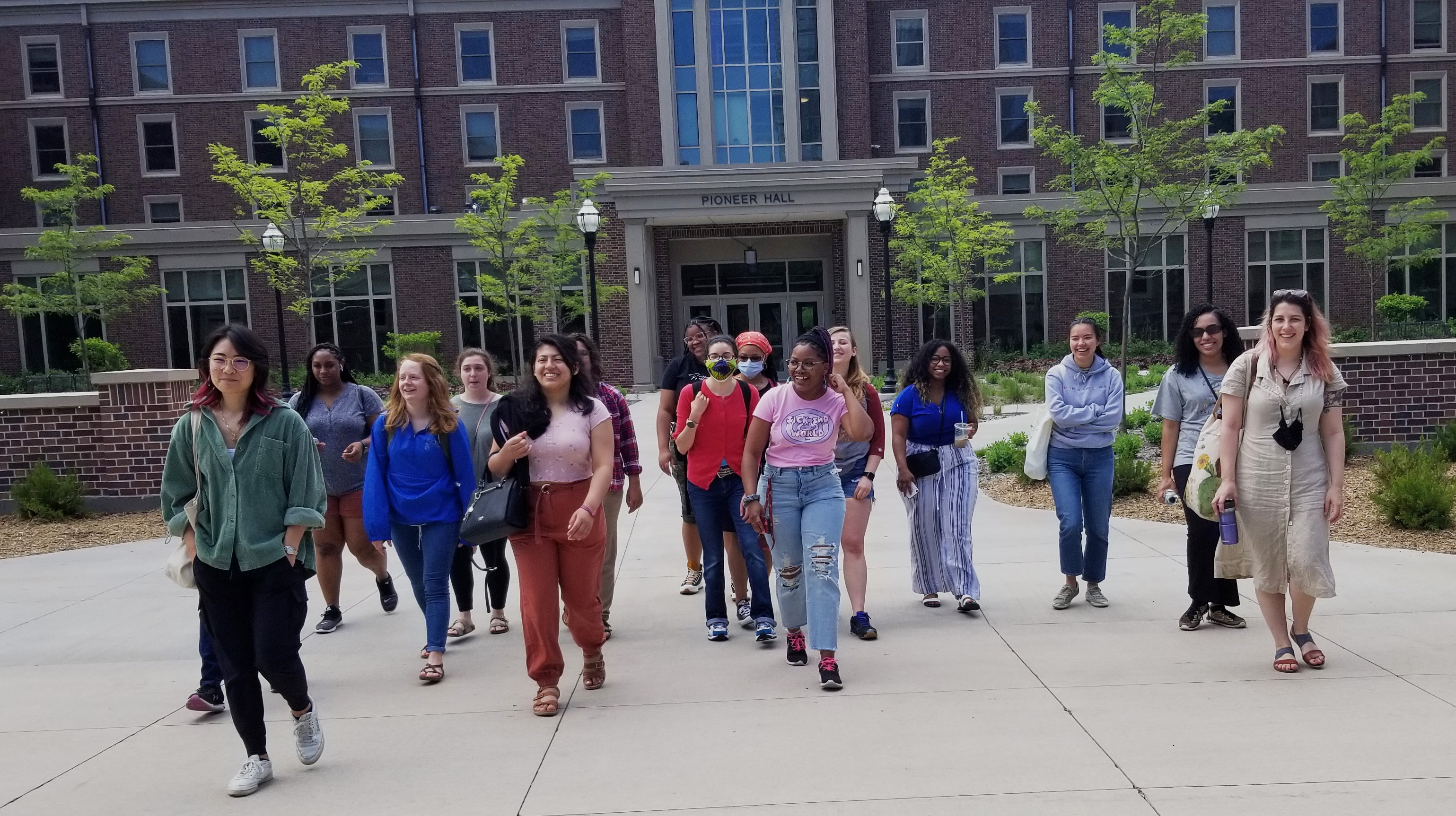SIAM Names Tayler Fernandes Nuñez as Inaugural SIAM EDGE Fellow

The EDGE Program, which is administered by the Sylvia Bozeman and Rhonda Hughes EDGE Foundation, supports women who are pursuing careers in mathematical research and education. By sponsoring an annual conference, a summer session, mentoring activities, and research-related travel, the organization aims to increase the number of women in leadership roles throughout the mathematics community.
The EDGE Summer Program is a rigorous month-long session for women who are entering Ph.D. programs in the mathematical sciences. The program, which takes place at a different university each year, is meant to prepare attendees for graduate-level research and qualification exams while simultaneously offering practical experience in a demanding academic environment. The 2021 EDGE Summer Program took place in June at the University of Minnesota, Twin Cities.
This year, SIAM sponsored a SIAM EDGE Fellow for the first time. Tayler Fernandes Nuñez—the 2021 recipient—was selected by EDGE instructors and co-directors for her exceptional work throughout the summer program. SIAM News recently sat down with Tayler to discuss her undergraduate trajectory, experiences with and reflections of EDGE, and future plans as she begins graduate school at Cornell University.
SIAM News: How did you first hear about the EDGE Summer Program?
Tayler Fernandes Nuñez: I found out about EDGE when I was a participant in the Pomona Research in Mathematics Experience—a Research Experiences for Undergraduates (REU) program that focused on group theory and number theory—under the leadership of Edray Goins. It was the summer of 2019 and the EDGE Summer Program also took place at Pomona College that year, so I met some of the EDGE attendees. They all encouraged the REU students to apply. I pocketed the idea and waited until I finished the Postbaccalaureate Program at Smith College, and I’m really happy that I kept it in the back of my head.
SN: Tell us about your undergraduate experiences. What kind of path led you to Edray Goins’ REU program, Smith College, and ultimately to EDGE?
TFN: I actually started at Northeastern University as a psychology major, but I found that I missed math. So I decided to take a logic course and I loved it. I knew just from the course that math is more artistic than it appears in the beginning stages, and I ended up switching my major to mathematics after my sophomore year. I attended a lot of conferences my senior year at Northeastern to showcase the research I did with Dr. Goins, and that’s how I learned about Smith’s Postbaccalaureate Program — a certificate program that involves a year of additional classes to help students prepare for graduate school. I earned a B.S. in mathematics from Northeastern and applied for Smith’s program because I hadn’t taken many advanced electives in mathematics as an undergraduate. I then applied for the 2021 EDGE Summer Program while earning my Smith certificate.
SN: What was the structure of this year’s EDGE Summer Program?
TFN: It was a four-week sequence of four classes. The first two weeks focused on real analysis and algebra, and the last two weeks emphasized machine learning and measure theory. We had six lessons per class and classes were about 1.5 hours. Our mornings consisted of either classes or problem sessions. After lunch, we had colloquium speakers, MATLAB minicourses, scheduled activities, or free time. Office hours with professors and mentors were in the evenings.
The problems that we worked on in class were difficult. There were between five and seven questions per problem set, six problem sets per class, and only two weeks for each class. The turnover was really fast.
SN: Sounds like a pretty rigorous schedule. Was it difficult to manage such a heavy workload?
TFN: I think that EDGE does a really good job of adding the stress factor that we need in order to make tough decisions about our learning processes. The pressure allowed me to be reflective of the way I address stress — it kind of shined a light into some of our strengths or weaknesses as individuals and also as learners.
EDGE also planned social events, so we had to figure out how to preserve our energy and recharge ourselves through other activities when we had work to do. In some ways, it was a smaller ecosystem of what we expect grad school to be like: lots of work, very intense, and difficult decisions on a day-to-day or week-to-week basis. And I think that was the purpose of the program. It’s about the math, but it’s more so about navigating who you are as a learner, figuring out those weaknesses, and preparing for grad school.

SN: How does EDGE encourage community building among participants?
TFN: I personally think that there is something to be said for overcoming difficult things together that builds community, and EDGE successfully balances difficult things with pleasure. That balance really promotes a healthy learning environment.
In the first week of the program, we had something called “Difficult Dialogues.” During this time, trained professionals came in and had deep conversations with us about our worries for graduate school and past traumas as women or people of color in the mathematical sciences. Having that dialogue in the very beginning allowed us to see each other as humans and acknowledge the difficulties that we had faced. Exposing each other to those kinds of experiences established a sense of community.
SN: The 2021 program was entirely in person. What was it like to physically gather with your peers after a year and a half of virtual events?
TFN: Honestly it makes me emotional! Being together in person was amazing. Everybody knows that learning or working online is not the same, and I lost a lot of my math confidence over the past year. It was very difficult to communicate online; it’s hard to gauge when to speak, and nobody wants to take more time on Zoom because everyone has Zoom fatigue. Being in person kind of diminished all of that. We were able to think out loud for the first time in over a year, and it really helped to accelerate a lot of my thought processes.
SN: SIAM President Susanne C. Brenner visited EDGE students on site this year. Did you have an opportunity to speak with her about SIAM?
TFN: We had the opportunity to speak with Dr. Brenner during one of our colloquium sessions. She emphasized the many opportunities for students in the SIAM community and encouraged us to have a go-getter mentality at conferences. Through this conversation, I gained some perspective on how mathematicians might navigate conferences like the SIAM Annual Meeting. My SIAM membership will allow me to participate in workshops and events with other mathematicians in my fields of interest and explore the many research areas I am currently enamored by.
If a graduate student in the mathematical sciences wants to be at the forefront of a particular field, joining SIAM would be a great first step. Membership offers them the potential to tap into this ecosystem of collaboration, career advancement, educational resources, and more. The value also goes both ways — the advancement of any field heavily depends on the inclusion of all who are dedicated to the mission.

SN: What was your initial reaction upon learning that you are the inaugural SIAM EDGE Fellow?
TFN: I was so surprised and really flattered. I feel sort of like a spokesperson for EDGE because I truly believe in its mission statement. It gave me the recharge that I needed to feel confident in my math ability, but also confident in myself as a student and as someone who can add value to the mathematical sciences. I really hope that I can be a mentor someday or even a professor teaching the classes. That would be a dream, and I will always be an EDGE cheerleader.
SN: You just began graduate classes in applied mathematics at Cornell University. Do you have any expectations for graduate school?
TFN: This is still a hard question for me to answer because my interests are so vast right now! I’m currently letting the classes I enjoy the most guide my way. It’s going to be a lot of experimenting with and gauging the types of courses I take, the people I talk to, and the relationships I form, and letting these things influence the kinds of projects that I pursue. I would like to conduct research that involves optimization—maybe combinatorial optimization in particular—and I hope to develop optimization techniques or utilize new methods in the field to build, restore, and/or nurture sustainable cities.
SN: What are your career aspirations for life after graduate school?
TFN: I want to stay in academia and work for a teaching university. Teaching is where my heart is, and solving really hard questions with friends is the goal. With EDGE, I had a month of making friends and doing math. It was stressful but it’s what I want to go to grad school for: to solve math problems with friends. It was exactly what I needed.
SN: What advice do you have for undergraduate students who are thinking about applying to EDGE?
TFN: Anyone who is a woman in mathematics should take the opportunity to meet other inspiring women and get paid to do so. That is the best thing you can do for yourself — to build not just your network, but your allies in a community where there are not many people like you. Math can be really isolating because you do a lot of thinking on your own, but EDGE offers a chance for you to have friends at different universities around both the country and world. It’s an opportunity to know a face when you go to conferences, and that in itself is a great networking tool. There are a lot of benefits, but there is also a lot that you can offer by being there and adding your perspective. Everybody in the individual cohort adds some sort of viewpoint; your perspective is needed and should be heard.
About the Author
Lina Sorg
Managing editor, SIAM News
Lina Sorg is the managing editor of SIAM News.

Stay Up-to-Date with Email Alerts
Sign up for our monthly newsletter and emails about other topics of your choosing.



